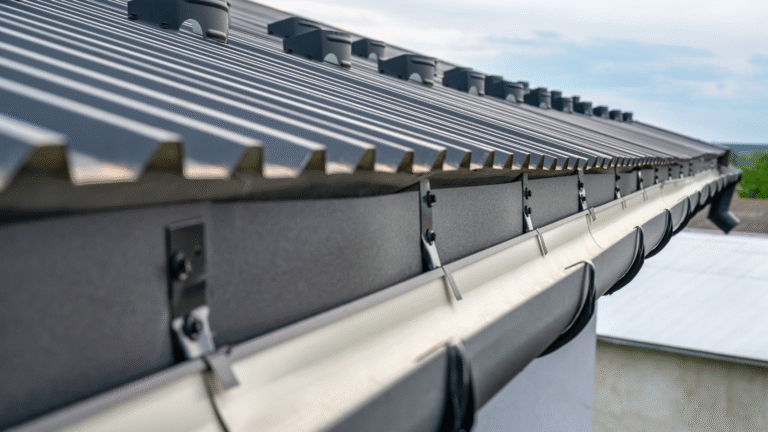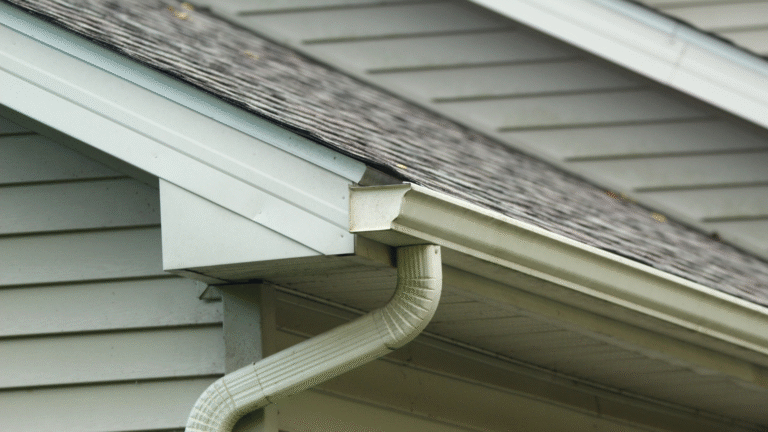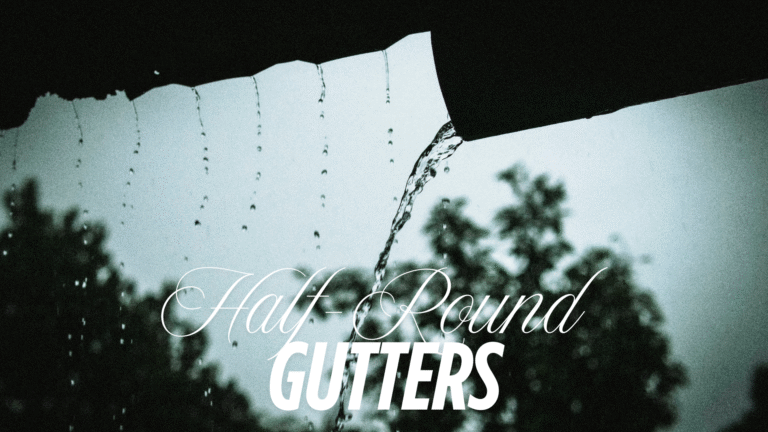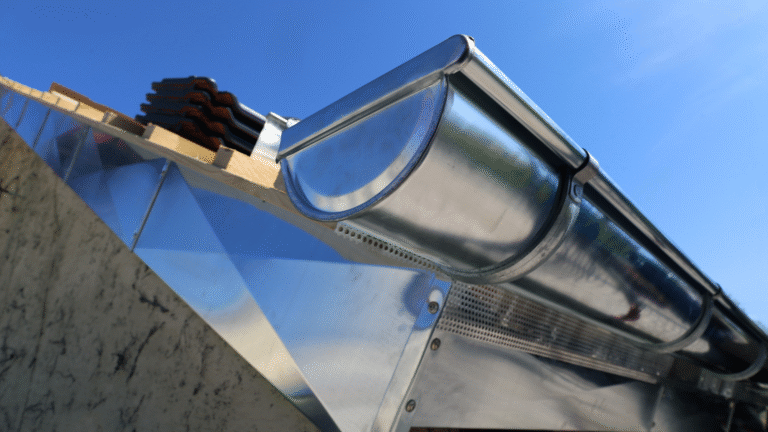Gutters are a critical component of every home’s exterior, designed to channel rainwater safely away from your foundation. However, without protection, these systems are vulnerable to clogging from leaves, debris, and even pests—causing water to overflow, damage the fascia, and compromise structural integrity. Every year, countless homeowners find themselves paying for repeated gutter cleaning or repairing preventable water damage. According to industry reports, clogged gutters cause over $450 million in property damage annually across the U.S. alone. This rising concern has sparked increased interest in gutter protection systems, especially among homeowners seeking low-maintenance, long-term solutions.
Modern homeownership is about working smarter, not harder—and that’s exactly where gutter guards come into play. With time and money being top priorities for many families, investing in a system that minimizes gutter upkeep while extending roof and siding lifespan is both practical and strategic. Gutter protection systems are no longer considered a luxury—they’ve become a preventative necessity. This article will dive deep into how they save homeowners valuable hours, prevent costly damage, and offer peace of mind for years to come.
What Are Gutter Protection Systems?
Gutter protection systems, commonly known as gutter guards or leaf guards, are specially designed barriers that prevent leaves, twigs, pine needles, and other debris from entering and clogging your gutters. These systems allow rainwater to flow freely into the downspouts while keeping out the unwanted materials that cause blockages. Available in various forms—such as mesh screens, micro-mesh covers, surface tension systems, and foam or brush inserts—they cater to different needs based on budget, roof design, and regional weather conditions. Their primary function is to enhance water flow and reduce the maintenance typically required by unprotected gutters.
Modern gutter protection systems are engineered with durability and efficiency in mind. Most are made of stainless steel, aluminum, or high-grade plastics that can withstand heavy rainfall, snow loads, and UV exposure. Some even come with anti-rust and anti-fungal coatings for extra longevity. Unlike traditional open gutters that require frequent cleaning and pose potential water damage risks, these systems act as a first line of defense against moisture-related issues. Many newer models are designed to integrate seamlessly with existing gutter setups, making installation less intrusive and more cost-effective. Whether you’re dealing with heavy fall foliage or constant debris from nearby trees, gutter protection systems offer a proactive solution to a recurring problem.
The Hidden Costs of Unprotected Gutters
Frequent Cleaning Expenses
One of the most immediate and ongoing expenses associated with unprotected gutters is the cost of regular cleaning. Most homeowners need to clean their gutters at least twice a year—more often if trees are nearby. Hiring professionals for each session can cost anywhere between $150 to $350, depending on your home’s size and height. Over a 10-year span, that adds up to $3,000 or more in maintenance alone. For those who choose to clean the gutters themselves, there’s still the hidden cost of personal time, effort, and safety risks associated with ladder use. These frequent cleanings become an endless cycle—especially during heavy autumn leaf fall or after storms.
Clogged gutters can quickly accumulate debris again just weeks after a cleaning, which means homeowners are stuck in a loop of scheduling and paying for repeat visits. Even small blockages can cause overflow and water misdirection. With no barrier in place to prevent future clogging, the financial burden grows each year. Gutter protection systems eliminate the need for constant upkeep, translating into long-term savings that far outweigh the initial investment. This time-saving solution helps homeowners break free from the never-ending expense of routine gutter maintenance.
Water Damage to Roofing and Foundation
Without proper drainage, rainwater can overflow from clogged gutters and seep into your roof, fascia boards, and siding. Over time, this constant exposure to moisture leads to rot, mold, and structural weakening. Repairing roof damage caused by overflowing gutters can cost anywhere from $1,000 to $10,000, depending on the extent of decay. Worse yet, if water reaches the foundation, it can cause cracks, leaks in the basement, or soil erosion around the home—all of which compromise structural integrity.
Water that pools near the foundation can lead to hydrostatic pressure buildup, forcing moisture into your basement or crawl space. These moisture problems are often misdiagnosed as plumbing leaks when in fact, they’re the direct result of poor gutter management. The cost of waterproofing a damaged foundation can exceed $15,000, while fixing mold issues alone may require thousands more. Gutter guards prevent these scenarios by ensuring rainwater flows efficiently through the drainage system, keeping your home protected from top to bottom.
Mold, Mildew, and Pest Infestations
Another often overlooked consequence of unprotected gutters is the environment they create for biological growth and pest infestations. Stagnant water trapped by debris offers the perfect breeding ground for mosquitoes, ants, and cockroaches. Birds and rodents may also nest in clogged gutters, creating health and hygiene risks for homeowners. These infestations can spread quickly and may require professional extermination services that cost hundreds or even thousands of dollars annually.
Meanwhile, moisture buildup can lead to mold and mildew growth on the exterior siding, attic, and even interior walls. Mold remediation is not only expensive—often ranging between $2,000 and $6,000—but also hazardous to health, especially for children, the elderly, or individuals with respiratory conditions. Gutter protection systems significantly reduce the likelihood of these issues by eliminating stagnant water and reducing organic debris buildup. This proactive measure ensures a cleaner, safer environment for your home and family.
How Gutter Guards Save You Money Over Time
Investing in gutter guards may seem like a large upfront cost, but it’s important to understand how these systems pay for themselves over time. The average cost for professionally installed gutter protection ranges from $1,000 to $2,500, depending on the size of your home and the type of guard used. While this may initially seem expensive, it eliminates the need for biannual cleanings, which can run $300 to $700 per year. Over 10 years, homeowners can easily save $3,000 to $7,000 in cleaning fees alone. Moreover, avoiding expenses related to water damage, structural repairs, pest control, and mold remediation can save an additional $10,000 or more over the lifespan of your home.
Gutter guards also preserve the overall condition of your home, meaning fewer long-term repairs and replacements. When gutters function properly, they direct water away from your foundation, reduce soil erosion, and protect siding, fascia, and roofing components. This enhanced efficiency can increase the resale value of your home, making it a valuable feature for prospective buyers. Some insurance providers may even offer discounts for homes with protective gutter systems, recognizing their role in preventing costly damage. Overall, gutter guards provide a solid return on investment—not just by reducing direct costs but by increasing the long-term health and value of your property.
Time-Saving Benefits for Homeowners
No More Weekend Gutter Cleaning
Cleaning gutters is a tedious and time-consuming chore that often requires hours of physical labor. With a gutter protection system installed, homeowners no longer have to spend their weekends climbing ladders or scooping out soggy debris. Here are the key ways gutter guards help reclaim your valuable time:
Eliminates the need for seasonal gutter cleanouts
Reduces the frequency of roof and gutter inspections
Avoids weather-related delays in cleaning tasks
Prevents emergency cleanups after storms
Minimizes time spent hiring, scheduling, and supervising professional cleaners
Reduces time spent dealing with clogged downspouts and overflows
Eliminates hours spent washing stained siding due to gutter overflow
Frees up time to focus on other home improvement tasks
No more hauling ladders, tools, and garden hoses for cleanup
Makes routine home maintenance more efficient overall
Prevents time-consuming pest removal due to nesting in debris
Offers peace of mind during heavy rain seasons
Stops you from needing to monitor gutters every time it rains
Frees you from seasonal maintenance checklists
Allows more time to enjoy your weekends without worry
Reduced Need for Routine Inspections
Without protection, gutters require frequent visual inspections to catch early signs of clogging, leaks, or pest infestation. Gutter guards drastically reduce the number of times you need to check or maintain your system. Here’s how they help cut down inspection time:
Self-cleaning designs reduce internal debris buildup
Less frequent rooftop walks or ladder climbs needed
Minimal maintenance means no need for monthly checks
Keeps water flow consistent even between rainstorms
Protects against unnoticed leaks or weak joints
Extends the time between full roofing inspections
Avoids the need to check for ice dams every winter
Stops blockages from forming in hidden corners
Reduces the urgency of post-storm inspections
Prevents hidden fascia and soffit water damage
Guards against overflow in high tree-density areas
Keeps your gutter system functioning autonomously
Allows seasonal checkups instead of monthly ones
Simplifies the overall home inspection process
Encourages proactive rather than reactive home care
Increased Roof and Home Longevity
Installing a gutter protection system is one of the most effective ways to extend the lifespan of both your roof and the overall structure of your home. When gutters are constantly clogged, water backs up under roof shingles, leading to rot, mold, and premature deterioration of roofing materials. Over time, this damage can reduce the life expectancy of your roof by up to 30%, forcing early replacement and costing homeowners anywhere from $7,000 to $25,000, depending on roof size and material. Gutter guards help maintain proper water flow and reduce moisture-related issues, which not only protects the roofing system but also the underlayment, attic insulation, and support structures beneath.
Beyond the roof, gutter guards also protect your siding, fascia, foundation, and landscaping. Overflowing gutters can stain and weaken siding, cause foundation cracks due to water pooling, and erode the soil around your home. These issues lead to expensive repair jobs and reduced curb appeal. On the other hand, a home with well-maintained gutters and clean exterior lines signals proper upkeep to potential buyers. Real estate experts confirm that homes with proactive maintenance measures like gutter guards often retain 5–10% higher property value. By simply preventing damage before it starts, gutter protection systems become a smart long-term investment that increases home durability, appearance, and marketability.
Safety Advantages of Gutter Protection Systems
In addition to saving time and money, gutter protection systems offer several significant safety benefits. By eliminating the need for frequent gutter maintenance and minimizing water-related issues, these systems help protect both your home and your health. Here’s how:
Reduces ladder-related accidents by eliminating the need for climbing up to clean gutters manually
Minimizes risk of roof slips during inspections or cleaning, especially in wet or icy conditions
Prevents water overflow that can create slippery walkways and dangerous ice patches in winter
Stops mold and mildew growth, which can cause respiratory issues, allergies, and other health problems
Discourages pest infestations, keeping disease-carrying insects and rodents away from the home
Eliminates the need for harsh chemical use during gutter cleanings, protecting the environment and your skin
Reduces fire hazards in dry climates where dry leaves and twigs in gutters can ignite
Protects siding and basement walls from hidden leaks that can create indoor humidity and unsafe structural conditions
Prevents electrical hazards by avoiding water overflow that could reach exterior outlets or basement wiring
Lessens foundation risk by redirecting water safely away from the base of the home
Keeps children and pets safer, as they won’t be exposed to water buildup or hazardous maintenance tools
Avoids strain and injury from lifting ladders, buckets, and debris
Improves overall home safety score, which may reduce homeowner insurance premiums
Lowers risk of fascia board damage, which can compromise gutter attachment and create falling debris
Promotes long-term peace of mind, knowing your gutter system runs safely and efficiently year-round
Best Types of Gutter Guards for Long-Term ROI
| Gutter Guard Type | Pros | Cons | Average Cost (Installed) |
|---|---|---|---|
| Micro-Mesh Guards | – Extremely fine mesh blocks all debris- Durable materials- Excellent for heavy foliage- Low maintenance- Works in most climates | – Higher upfront cost- May require professional installation | $1,500–$2,500 |
| Surface Tension Systems | – Uses water adhesion to direct flow- Effective at shedding leaves- Long-lasting- Minimal maintenance | – May not work well with steep roofs- Can clog at entry points | $1,200–$2,000 |
| Foam Inserts | – Easy DIY install- Inexpensive upfront- Fits most gutter shapes | – Can trap seeds and moss- Needs frequent replacement- Less effective in heavy rain | $400–$800 |
| Brush Guards | – DIY-friendly- Easy to remove and clean- Budget-friendly | – Ineffective against fine debris- May attract nesting birds | $300–$700 |
Professional Installation vs. DIY: Which Is More Cost-Effective?
While the idea of installing gutter guards yourself may seem like a money-saving shortcut, the long-term cost-effectiveness of professional installation often outweighs the initial DIY appeal. Many DIY gutter guard kits, including foam inserts and brush guards, are affordable and easy to install, typically costing between $200 and $600. However, these products tend to wear out quickly, require frequent replacements, and may not offer comprehensive protection against smaller debris or severe weather. DIY installations also carry risks like improper fit, water overflow, and voided roofing warranties. If not installed correctly, even high-quality guards can become ineffective, allowing water to seep under the roofline or cause gutter sagging.
Professional installation, although more expensive upfront, ensures precision, structural compatibility, and product warranties that protect your investment for years. Installers assess your roof pitch, gutter width, and drainage patterns to match the right system to your home’s needs. With pricing typically ranging from $1,000 to $2,500, depending on size and guard type, the cost includes labor, expert fitting, and long-lasting materials. Many professionally installed systems come with 20+ year warranties or lifetime guarantees, eliminating future replacement costs. Ultimately, while DIY may offer short-term savings, professional installation delivers long-term reliability, safety, and value—making it the more cost-effective solution for most homeowners.
Final Verdict:
When weighing the long-term benefits, gutter protection systems prove to be more than just a convenience—they’re a strategic investment. From preventing costly water damage and reducing cleaning expenses to enhancing home safety and extending roof life, gutter guards offer a practical solution for homeowners looking to save time and money over the years. While the upfront installation cost may seem steep, the return on investment becomes evident in the form of fewer repairs, fewer service calls, and fewer hours spent maintaining your home’s exterior. As the demand for low-maintenance, value-boosting home upgrades grows, gutter protection systems are becoming an essential feature for modern properties across all climates.







